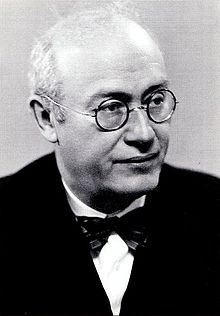
Summary
Rudolf Karel (9 November 1880 – 6 March 1945) was a distinguished Czech composer.
Rudolf Karel | |
|---|---|
 |
Biography edit
Rudolf Karel was a son of a railway employee. He studied law at Charles University and then composition from 1899 to 1904 with Antonín Dvořák and organ with Josef Klička. When WWI started he was visiting Russia. He was arrested, but managed to escape. He joined Czechoslovak Legions and served as a conductor of their orchestra. In 1923 he became a professor at Prague Conservatory. During WWII he took part in the resistance and in March 1943 was arrested. After being interned and tortured at Pankrác prison for two years (1943–1945) Karel was sent to Theresienstadt prison. The conditions in the prison were dire and he became ill with dysentery and pneumonia.[1] SS-Oberscharführer Stefan Rojko sent all ill prisoners outside in freezing cold to disinfect the cell. As a result Karel and 8 other prisoners died on 6 March 1945.[2]
Ih Pankrác and Theresienstadt he continued working. He composed five-act fairy-tale opera Three Hairs of the Wise Old Man, writing on toilet paper using pencil or medicinal charcoal. The 240 sheets containing a detailed sketch of the opera was secretly passed to a friendly warden. The orchestrations were completed after his death and from his notes by his pupil Zbynek Vostřák.[3]
His Nonet op. 43 (though left incomplete at the time of his death)[4] was composed between January and February 1945. It was orchestrated by František Hertl and premiered in December 1945.[4]
Works (selection) edit
Piano edit
- 1910 Theme and variations op.13
Opera edit
- 1909 Ilseino srdce (Ilsea's Heart)
- 1932 Smrt Kmotřička, Op.30 (Godmother Death)
- 1944 Tří vlasy děda Vševěda (Three Hairs of an Old Wise Man)
Orchestra works edit
- 1904/1911 Scherzo Capriccio op.6
- 1909 Ideals, a symphonic epic op.11
- 1914 Symphony for violin and orchestra op.20
- 1918/1920 Demon Symphony op.23
- 1921 Renaissance Symphony op.15
- 1938 Spring Symphony op.38
- 1941 Revolution Overture. Op.39
Chamber music edit
Sources edit
- Stanley Sadie (Ed.) The New Grove Dictionary of Music & Musicians. 1980.
- Darryl Lyman: Great Jews in Music. Jonathan David Publishers, New York N.Y. 1986,
References edit
- ^ Jan Charypar. "The Fate and Works of Rudolf Karel during World War II".
- ^ Karas, Joža (1985). Music in Terezín 1941-1945. Stuyvesant, NY: Pendragon Press. ISBN 9780918728340. p.191.
- ^ CD notes: Suppaphon SU 3266-2 661
- ^ a b Woolf, Jonathan (August 2001). "Review of a Supraphon recording of the Nonet". Retrieved June 19, 2012.
- ^ a b c d "Earsense: Rudolf Karel". Retrieved June 20, 2012.
- ^ at IMSLP.
External links edit
- Free scores by Rudolf Karel at the International Music Score Library Project (IMSLP)


